How Much of the Internet Is Fake? asks an article in the Intelligencer that originally appeared in the December 24, 2018, issue of New York Magazine.
“Turns Out, a Lot of It, Actually.” is the immediate answer given in the heading. From the article:
Studies generally suggest that, year after year, less than 60 percent of web traffic is human; some years, according to some researchers, a healthy majority of it is bot. For a period of time in 2013, the Times reported this year, a full half of YouTube traffic was “bots masquerading as people,” a portion so high that employees feared an inflection point after which YouTube’s systems for detecting fraudulent traffic would begin to regard bot traffic as real and human traffic as fake. They called this hypothetical event “the Inversion.”
After describing the fake metrics, fake people, fake businesses, fake content, and fake politics, the article concludes:
We ourselves are fake.
Which, well. Everywhere I went online this year, I was asked to prove I’m a human. Can you retype this distorted word? Can you transcribe this house number? Can you select the images that contain a motorcycle? I found myself prostrate daily at the feet of robot bouncers, frantically showing off my highly developed pattern-matching skills — does a Vespa count as a motorcycle, even? — so I could get into nightclubs I’m not even sure I want to enter. Once inside, I was directed by dopamine-feedback loops to scroll well past any healthy point, manipulated by emotionally charged headlines and posts to click on things I didn’t care about, and harried and hectored and sweet-talked into arguments and purchases and relationships so algorithmically determined it was hard to describe them as real.
Where does that leave us? I’m not sure the solution is to seek out some pre-Inversion authenticity — to red-pill ourselves back to “reality.” What’s gone from the internet, after all, isn’t “truth,” but trust: the sense that the people and things we encounter are what they represent themselves to be. Years of metrics-driven growth, lucrative manipulative systems, and unregulated platform marketplaces, have created an environment where it makes more sense to be fake online — to be disingenuous and cynical, to lie and cheat, to misrepresent and distort — than it does to be real. Fixing that would require cultural and political reform in Silicon Valley and around the world, but it’s our only choice. Otherwise we’ll all end up on the bot internet of fake people, fake clicks, fake sites, and fake computers, where the only real thing is the ads.
